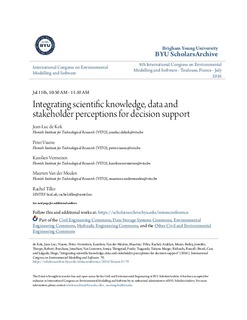Integrating scientific knowledge, data and stakeholder perceptions for decision support
de Kok, Jean Luc; Viaene, Peter; Vermeiren, Karolien; Van der Meulen, Maarten; Tiller, Rachel Gjelsvik; Ardelan, Murat Van; Bailey, Jennifer L.; Thorpe, Robert; Beecham, Jonathan; Vanleeuwen, Sonja; Thingstad, T. Frede; Tsagaraki, Tatiana; Richards, Russell; Bizsel, Can; Salgado, Hugo
Chapter
Published version

View/
Date
2016Metadata
Show full item recordCollections
- Institutt for kjemi [1405]
- Institutt for sosiologi og statsvitenskap [2849]
- Publikasjoner fra CRIStin - NTNU [38679]
Original version
In Proceedings of the 8th International Congress on Environmental Modelling and SoftwareAbstract
The marine food web is considered to be a factor of key importance for the global carbon balance. The concept of the ‘Biological Pump’ refers to the mechanism by which CO2 fixed by photosynthesis is transferred to the deep ocean through biologically-driven processes, resulting in sequestration of carbon for a period of decades or longer. Stressors affecting the efficiency of the biological pump include water column stability, sea temperature, acidity, excessive nutrients inputs, overfishing, pollution and other anthropogenic changes. The aim of the EU-FP7 project OCEANCERTAIN is to reduce the uncertainties in our understanding of the impacts of these stressors on the mechanisms underlying the biological pump, and the resilience of coastal and marine stakeholders for the social-economic impacts of changes in the marine food web. Modelling, field sampling and stakeholder workshops are combined for three case studies in the Arctic, the Eastern Mediterranean and Patagonia. The central paradigm of the project is ‘Consilience’ referring to the integration of data, information and scientific knowledge from different domains and sources to achieve an added value surpassing that of the individual elements. A close collaboration between natural and social scientists, and software engineers is inherent to the concept of consilience. The project results are used to design a Decision-Support System (DSS) integrating scientific knowledge with data and stakeholder expertise, serving as platform for policy analysis. Consilience, and more in particular systems analysis, are the basis for the DSS architecture but by themselves these cannot solve all the practical and methodological issues encountered. A challenge for the project is the integration of the findings and knowledge of the behavioral and natural sciences in the DSS. A combination of three techniques is used to address the issue: a component-based architecture, meta-modelling to represent the biophysical processes described by the components, and fuzzy cognitive mapping to represent narrative scenarios derived from local knowledge.